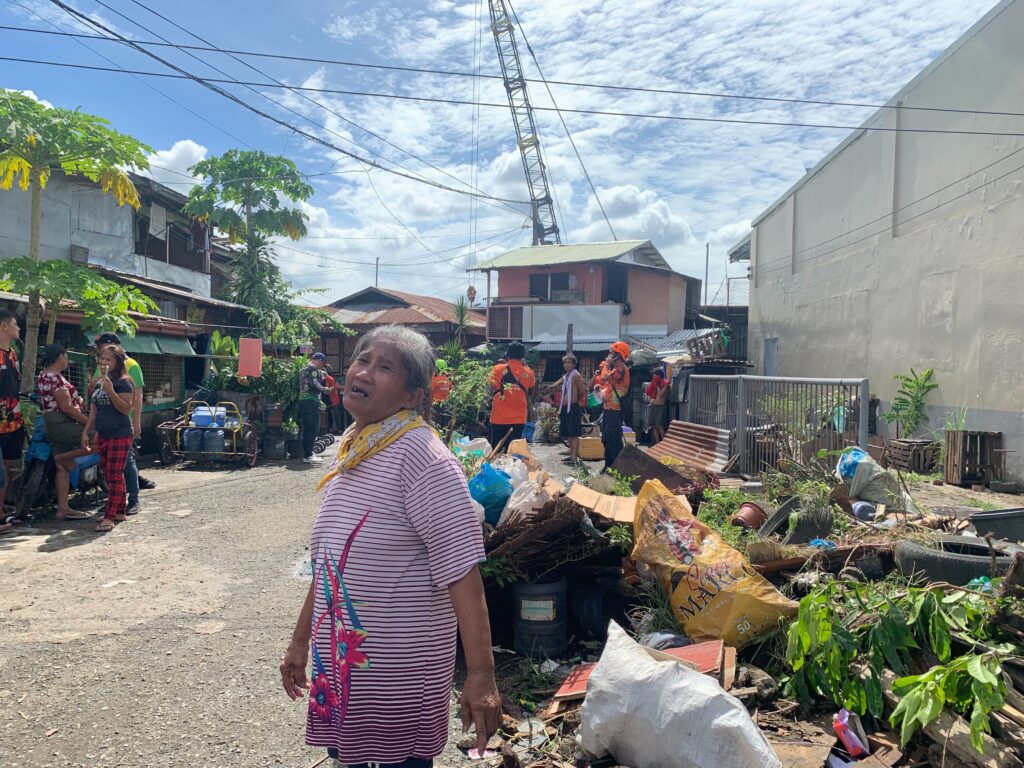
Elisa Javier, one of the affected residents, said on Wednesday, October 11, that she was willing to relocate, but she also mentioned that financial assistance is much needed as well. | Rashe Zoe Sophia B. Piquero
CEBU CITY, Philippines — Families, living at the mouth of the Estero de Parian, who will be relocated to a safer and permanent resettlement area in Cebu City, are calling on the city government to give them financial assistance, too, to help them start their life anew there.
In an interview with CDN Digital on October 11, Elisa Javier, one of the affected residents, said that she was willing to relocate, but she would also need financial assistance from the city government.
“Nalipay na unta mi. Gali lang, ang kwarta ang kuwang namo,” Elisa Javier said.
(We are happy [to be relocated]. But, what we lacked is money.)
She said that they were moving to a new place and they would need the financial assistance to start anew.
READ: ‘Task Force Gubat sa Baha’ tags 4K families encroaching the three-meter easement zone
From Estero de Parian to Sitio Nangkaville
Elisa Javier was among the Barangay San Roque, Cebu City residents, who made up the 10 families to be relocated on October 26 from their homes in Estero de Parian to Sitio Nangkaville in Barangay Quiot Pardo, Cebu City.
The Estero de Parian is in Barangay Tinago, however, the area where the affected residents were living were already under the jurisdiction of Barangay San Roque in Cebu City.
These affected families residing at the mouth of Estero de Parian, at the port area in Barangay Tinago and San Roque, will evacuate the area after the Task Force Gubat sa Baha recommended their transfer due to danger during flooding.
They are given a deadline to remove their belongings from their homes by October 26 and they would be evacuated and relocated to the resettlement area in Barangay Quiot Pardo.
READ: Floods caused by heavy rains, clogged drainages in Cebu, says CCDRRMO
Affected residents: resettlement and cash
Marialy Javier, who opposed the idea of relocating to another area, said that they did not have a choice but to move from the area.
“Actually dili jud okay, kay lisod kaayo. Mao ra jud mi magbalik sa uno ani,” Marialy Javier said on the impending relocation on October 26.
(Actually, I am not okay with it, because it is very difficult for us. It will be like us starting again.)
She said that what they wanted would be for the government to provide them with a comfortable settlement in their new location and adequate financial support for their necessities.
READ: Metro Cebu execs seek lasting solution to floods
Money to buy housing materials
Noralyne Cañete, another affected resident of Estero de Parian, agreed with the Javiers’ concerns.
Cañete, who has three children, worries about their financial situation there at the relocation site and how they could build their homes there, without any cash to buy housing materials.
“Okay ra man [relocation]. Ang akong problema kay ang kwarta para sa materyales, pagtukod sa balay,” Cañete said.
(The relocation is okay. The problem would be the money to buy housing materials to build our home.)
She also said that it would be difficult to relocate there especially since it would bring them farther away from the school of her three children.
“Hasol kaayo ba kay dili baya basta-basta maka-transfer gud,” Cañete expressed.
(It would be a hassle for us because at this time we cannot just transfer our children to schools there.)
READ: House bill on on-site relocation of informal settlers approved on 2nd reading
But Harold Alcontin, head of the Cebu City Disaster Risk Reduction and Management Office (CCDRRMO), said that they were just following a policy of the Cebu City government.
Alcontin said that residents were given two options: financial assistance or relocation to a permanent place.
He said that the residents must only choose one.
Alcontin said that this policy was in accordance with the policy of the Division for the Welfare of the Urban Poor (DWUP) of Cebu City.
Despite this, the CDRRMO chief said that he would forward the concerns of the affected families to the Cebu City mayor.
READ: Solon asks House to prioritize bill providing rental subsidies to informal settlers
CDRRMO can help with housing materials
He also said that they could also provide housing materials to the affected families and food support to each of the families for three days at the resettlement area, which would be enough time for them to be “stabilized.”
The Javiers and Cañete and the affected families to be relocated were already evacuated from their homes and were staying temporarily at the barangay hall of San Roque along Arellano Boulevard in Cebu City.
The Cebu City government has given the affected residents until October 26 to secure their things from their homes in Estero de Parian before they would be relocated to the resettlement area in Barangay Quiot Pardo.